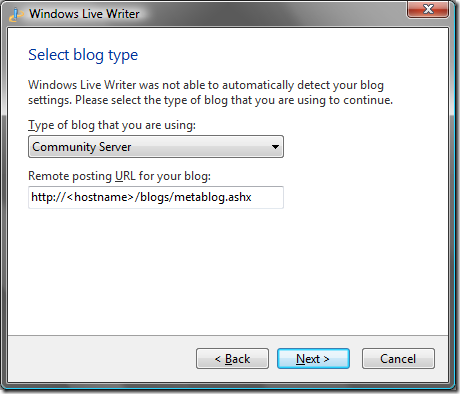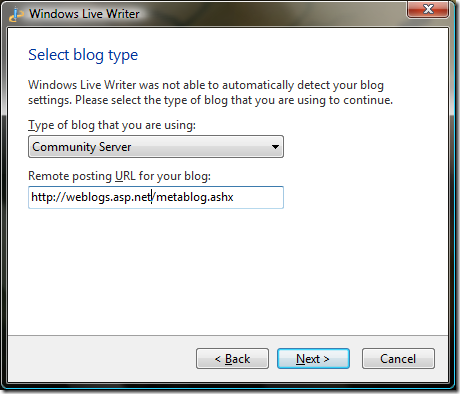Archives
-
Windows Server 2008 Tidbit #3,627
Feel free to mock me but I’m just a simple developer, your modern ways frighten and confuse me.

If you know me, I’m a command line junkie and I’m all for shortcut typing and trying to maximize the effort my fingers have to go through by typing less (no, this doesn't mean I use 3 character variable names). I’ll rarely type a full path when jumping around in a command prompt and use the tab key and “*” character quite aggressively.
In any case, nothing like stumbling over a goofy little thing in the middle of the night as I’m setting up a new VM. I was currently setting up a new virtual network for some MOSS development and going through the motions of creating a new 2008 server, creating a domain controller, adding IIS, lather, rinse, repeat. As I was setting up the DC (using an IPv4 of 10.0.0.1) I accidently typed this:
C:\Users\Administrator>ping 10.0.01
(rather than the full address of 10.0.0.1)
And surprisingly got this result:
Pinging 10.0.0.1 with 32 bytes of data:
Reply from 10.0.0.1: bytes=32 time=46ms TTL=128
Reply from 10.0.0.1: bytes=32 time<1ms TTL=128Hey! Wait a minute. That’s not what I typed, I missed the last period (bet all your girlfriends say that?).
Curiosity got the better of me so I tried variations:
C:\Users\Administrator>ping 10.001
C:\Users\Administrator>ping 10.01
C:\Users\Administrator>ping 10.1
All getting the same result. So now rather than having to plug in those extra few digits I can happily type 10.1 over 10.0.0.1 when doing stuff like this.
Like I said, I may be slow on the uptake and most of the planet already knows this trick so go ahead and call me names. I’m just a simple developer, your modern ways frighten and confuse me.
-
Setting up Windows Live Writer with weblogs.asp.net
Just a quick tip on anyone setting up the latest version of Windows Live Writer (14.0.8064.206) and publishing to http://weblogs.asp.net.
By default, when you run the wizard it’ll stumble over the the autodetection so you’ll have to select your blog provider manually. Here’s the default selection when choosing Community Server:
Note the remote posting URL. The default value is incorrect (probably because weblogs.asp.net is a subdomain). Entering http://weblogs.asp.net/blogs/metablog.ashx will result in an error and you might be left scratching your head why you can’t publish your blog.
The proper URL should be http://weblogs.asp.net/metablog.ashx like so:
Just thought I would pass this tip along in case anyone was having problems getting connected.
-
Signing Time and Vista
Scott recently posted an update (his third or fourth on the subject, I've lost count now) on using the Signing Time DVD series to help babies learn to grow. I just wanted to send out a nod to Rachel Coleman and her company, Signing Time, as well. Since Vista was a few months old we've turned her onto Signing Time and she's grown to have a signing vocabulary of over 60 signs in the past year.
Is Vista hard of hearing? Not in the least. In fact she's overly sensitive to sounds and has the hearing equivalent of better than perfect vision.

When Vista was about 6 months old we got turned onto the Signing Time DVDs (by picking up a copy of Baby Signing Time). Until that point, Vista really didn't watch much TV (she still doesn't) and wasn't too interested in TreeHouse (the local kids learning channel). When we sat down and watched Baby Signing Time with her the first time, she was glued to the set. I don't know what it was about it, but she was totally into it. Now grant you, being fixated with a television show isn't the greatest thing to start your kids off with but we felt it was a learning tool and stuck it out to see what would happen.
Eventually she started showing signs of, well, signing. Her first "word" was milk. She started telling us when she wanted a bottle (or agreeing with us when we told her she needed one). It took time but at one point there was a literal explosion of signs. Within the span of days sometime after being exposed to the DVDs, she signed Dad, Sleep, and Baby. Other signs came along over time. Here was a child not even 1 year old and we were communicating and interacting with her. She could tell us when she was hungry, when she needed her diaper changed, and when she was tired and ready for bed. When our dogs bark, she started signing the sign for dog. It was literally incredible to watch this and experience it.
Vista is almost two now and the last time we went through and checked, she was signing up around 60 signs. I suspect that's grown as she keeps adding new ones. We find it amazing to discover new signs with her and frankly, sometimes she signs something that we look up and discover "Oh, I didn't know you knew that" (like Bear, which to this day I still don't know where she picked it up from). Vista is talking these days and will sometimes mix talking with signing, but that's okay since we understand her. Like I said, her hearing is superb. She's been slow to develop some skills (like motor skills and speech) so a few months she was tested for hearing. It turned out stellar and her hearing is better than average (which accounts to her sensitivity to loud sounds that scare her).
It doesn't matter if you child is hard of hearing or has some other disability (I hate that word as I don't consider it that, but can't think of a better term right now). Signing really helps kids communicate with parents faster. I don't know what frustrations we would have gone through if we had to wait until she was 1 1/2 or 2 years old before we could have a conversation with her. However learning it does take time, practice, and patience. It did explode for us and Vista was signing all kinds of things for a few weeks there but it took a long time (I think months) to get there. So be patient with them and don't just plop them in front of the TV and walk away. Interact, talk, encourage, and reward them. Eventually you'll hit paydirt and the jackpot will come in as they tell you what they want or how they feel, rather than crying or screaming at you.
I think the way Rachel presents the topic really hits home. This might be in part due to the fact that she created the Signing Time series to sign with her daughter Leah who is deaf. Rachel presents the sign, there's usually a graphic of it (sometimes an animation) and the word is spelled out on-screen. To support the sign there's sometimes a song (or at least music) to accompany it then short videos of real kids doing the sign. To me, this is probably the single selling factor that got Vista hooked. She just loves looking at babies (I think all babies do, don't they?) so seeing other kids actually performing the signs and the act associated with it (eating a cookie, drinking milk, having a bath, etc.) makes it that much more real. The association is what makes it real and grounded IMHO. We did try some other DVDs but they fell flat on their face with stale and lifeless content. Signing Time always keeps Vista's attention as she can relate to what's going on and reacts to it.
In any case, if you have a small child under 2 and you're interested I *highly* recommend Signing Time. Grab a copy of the Baby Signing Time kit to see if they like it and give it a whirl. It's a small investment for a big return. Like Scott, I am not affiliated with Signing Time but think Rachel and co. are in a word incredible.
Apologies for the non-technical interruption. We now return you to your normally geeky life.
-
Passion and Pride
No, you didn't stumbled onto the beginnings of a new Jane Austen novel. It's been a heck of a long time since I blogged and despite being abducted by aliens for the last month, I'm back on the wagon again.
Passion and Pride. These are two key attributes I follow in work. Lately I've been combing the streets for contracts and meeting with all sorts of interesting challlenges, people, and organizations. The one thing that comes up often is the question of values (both in life and work). When I'm talking to these people I emote a strong belief in passion and pride both in teams and a company itself.
I have a deep passion in what I do. Whether it's building ginormus infrastructures in SharePoint or writing a single unit test. I enjoy what I do. I think it's important that you feel what you do is important and have a sense of passion behind doing it. After all, if you're not enjoying your work maybe you should consider going elsewhere? Or changing your environment to suit what you like. You are in control of your destiny. Someone once asked me (as a team lead) when I was going to send them on training for xyz product. I asked them why they haven't gone already and why they were asking me. I'm glad to send people on training if they want it, but I won't shuffle off a team to a week long course because somebody in the organization thinks they "need it". You know what you need and what you want. If you want to better your skills in .NET or Scrum or OO and find something out there you like (I highly recommend J.P. Boodhoo's course but not sure if he's still doing them) then by all means I will fight the good fight (if that's my job) to get you out there. The point here is that you need have passion in what you're doing. J.P. is one of the most passionate persons I know in the software industy and it shows.
Don't get me wrong, you still need technical aptitude. Notice I said aptitude and not skill. Frankly, if you understand structured programming and can grasp the basics of good OOA/OOD there's not a single language or environment on the planet you can't learn. Skill is an attributed applied. I've always considered software an art. My background started in art, and IMHO building software is creation of a new piece of art. With creating art comes passion and you apply skill to hone your craft. When I first started sculpture in High School, I really didn't know what I wanted to produce. My teacher at the time was a great man who, rather than sticking to cirriculum, took his classes through every media known to man. Iron, wood, clay, etc. He wanted each person to find their niche. Their passion. If sculpture wasn't your cup of tea that's fine but at least you tried it. Maybe .NET development isn't your gig. Try something else. Another language perhaps. Or maybe your prefer the Linux platform to Microsoft. Or Apple. In any case, there's a sense of discovery that has to happen. You'll know your passion when you see it. Once you find it, land on it and hone your craft.
The other side of the coin is pride. Again, whether it's a single unit test or an entire solution I try to take pride in what I do. I have a fault in that I'm a bit of a perfectionist so I'm always going back and tweaking something until it's "just right", but it never is. To me this is my continuous improvment technique. I hone my skill by practice, practice, practice and I reflect. When I look at what I've done (and while I'm doing it) I try to take pride in what I'm doing. Recently we had a discussion at a user group where the developer was presenting code he had written to solve a problem. The conversation dipped into things like writing good solid code, abstraction, re-usability, etc. One comment was that "it's only demo code" and that somehow forgave all the issues that I saw in the codebase. True, if you're doing a demo to present to someone you might skip some good practices. For example, not writing unit tests. This is probably the biggest thing I see and perhaps the easiest to accomplish. However I saw if you're building something for anything other than a spike (that you'll throw away) then take pride in your work. If the code starts to get ugly, think about how it might better be accomplished. Is there a pattern here you could use? A state pattern for example to remove an ugly case or switch statement? The biggest excuse will be "I don't have time to make it pretty, just make it work". I don't know how many times I've heard that but then years later come back and see that "ugly code" running a mission critical system.
Take pride in what you do everyday and in everything. It'll reflect in your work and that day that it needs to grow, it won't be a "let's rewrite this correctly". It may take more time at first to "do the right thing" but please don't sacrifice good software practices for the sake of time. I personally have no issues going to a client to say "we can't deliver you xyz functionality in the given time/budget/resources but can give you x and y fully tested and reliable". It's a hard sell but one you have to make. Being proud of the work after the fact shows through it's lifetime and you'll be able to go back and *really* re-use what you've done rather than re-invent. On the flipside, like my perfectionist side, don't go overboard with pride. If you're truely under the gun for delivery take whatever measures you have to do meet those goals but do it smartly. Not every "i" has to be dotted and "t" crossed, but you also don't have to throw out entire modules because of shortcuts. It's a difficult balance but one that will come with time and patience.
So bottom line. Be proud in what you do and have passion in doing it.
Anyways, that's all I have to say about that. Welcome to 2009.

